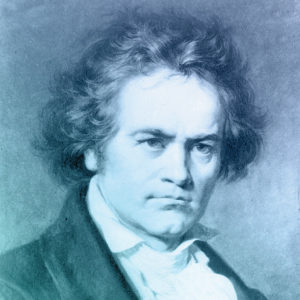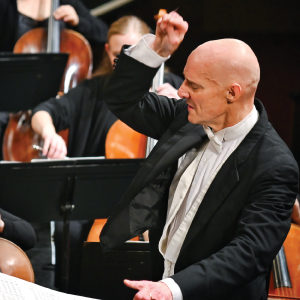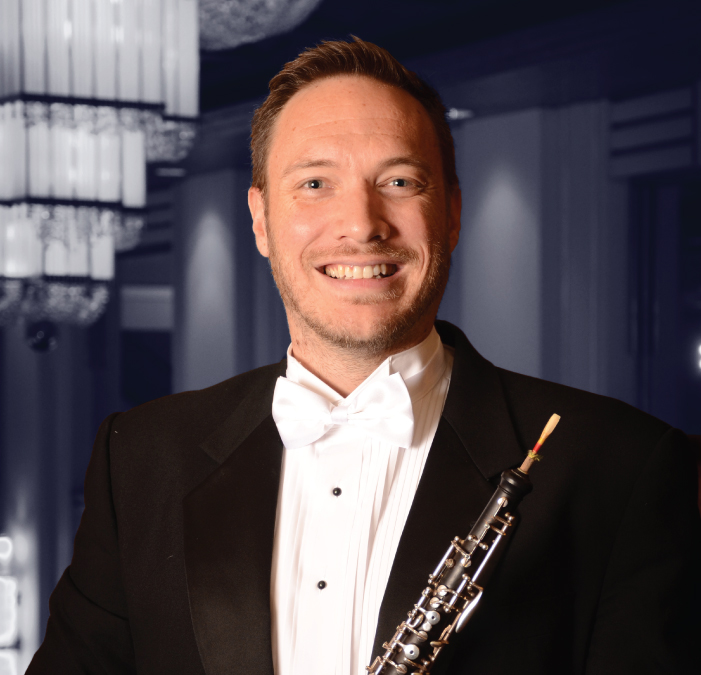The essence of German composer Ludwig van Beethoven can be felt in just the first few triumphant notes of his fifth symphony. Recognized as one of the most consequential composers in western civilization, the QCSO will honor his legacy in Masterworks V on Saturday, March 2, and Sunday March 3.
The program also features a stunning solo performance by QCSO Principal Oboist Andrew Parker. Having joined the QCSO in 2009, Parker will cast a spell upon the audience with Strauss’ Oboe Concerto.
The Revolutionary Beethoven
Beethoven’s career is commonly divided into three periods: early, middle, and late. It was during his early period in 1795 that he composed his Twelve German Dances, the first piece to be performed during this weekend’s program.
 “We open with the early music of a very young Beethoven,” said QCSO Music Director and Conductor Mark Russell Smith. “We get to hear his very early influences.”
“We open with the early music of a very young Beethoven,” said QCSO Music Director and Conductor Mark Russell Smith. “We get to hear his very early influences.”
Twelve German Dances delivers a colorful, charming start to Masterworks V. The piece is wistful as it moves through each dance, flirting with the audience through subtle, stylized moments.
“Unquestionably he is one of the greatest classical composers in the history of western music,” said QCSO Executive Director Brian Baxter. “His music was revolutionary. It was unlike anything anyone had ever heard or experienced before.”
Twelve German Dances really does feel light, especially in contrast to Beethoven’s fifth symphony. But the program moves secondly into Strauss’ Oboe Concerto, arguably the most dazzling portion of Masterworks V.
Andrew Parker’s Olympic Feat
The strength and talent required to perform a piece like Strauss’ Oboe Concerto should not be understated. Much like an athlete, QCSO Principal Oboist Andrew Parker has trained intensely.
“For an oboist to perform this piece is an absolute Olympic feat,” Baxter said. “Andrew should get a gold medal every time he plays it. It’s unbelievable the amount of physical energy and training that goes into performing that piece at the level required.”
Written in 1945, Strauss’ Oboe Concerto consists of three interconnected movements. The piece is inherently referential, sometimes interpreted as post-modern in its observance of the first few decades of the 20th century.
“Strauss was kind of the last of the great German composers,” Russell Smith said. “The end of WWII spelled the end of old school Germany as we knew it, both the good and bad.”
Alone Parker tackles the piece, leaving him both nervous and excited less than a week out from the performance.
“I’m absolutely nervous, of course. I care a great deal,” Parker said. “I’ve poured my entire life into developing some degree of mastery over this art form.”
“But I’m very excited. I’m so lucky I get to share this fantastic music and all the work I’ve done with a community I’m formed a bond with over the past ten years.”
Parker says the second movement is bound to leave the audience in awe with its beautiful melodies. “It’s this very lyrical, slow, heartfelt and tender, poetic melody. I think the audience will really find it to be transformative.”
Russell Smith has no doubt in Parker’s ability to astound. “Andy is a great artist and musician. The thing we instrumentalists try to do is sing with our instruments. We try to imitate the human voice. And Andy sings on the oboe like nobody else.”
The Journey of Beethoven’s Symphony No. 5
The program concludes with Beethoven’s landmark Symphony No. 5. The piece is authentically emotional, capturing a sense of humanity that some say Beethoven had a difficult time expressing.
“Most of Beethoven’s music that everyone knows and loves was written when Beethoven couldn’t even hear it,” Russell Smith said. “He was kind of difficult guy in life but was able to capture in his art the human condition. He was able to express things through his art that he couldn’t do so interpersonally.”
 Completed in 1808 during Beethoven’s middle period, the piece consists of four movements and was first performed in Vienna’s Theater an der Wien. It feels almost rock and roll in sound and nature, blasting the audience as soon as it begins.
Completed in 1808 during Beethoven’s middle period, the piece consists of four movements and was first performed in Vienna’s Theater an der Wien. It feels almost rock and roll in sound and nature, blasting the audience as soon as it begins.
“His music is both muscular and sensitive,” Russell Smith said. “The way he constructs music is inherently powerful. He knows how to build something that is inextricable, that has such incredible trajectory.”
Parker agrees, having a lot of respect for Beethoven as a composer and practiced musician.
“I can relate to Beethoven very well,” Parker said. “He put a lot of blood, sweat, and tears into his work. That’s what I feel like my relationship is with my artform and craft.”
Parker believes that both Beethoven and Strauss have an ability to portray love in a way that other composers cannot. “Both of them were very capable at revealing an unbelievably beautiful, sonic representation of what it’s like to love or be in love. I don’t just mean romantic love; all forms of love, of family, friends, and life.”
“Both composers could achieve absolute bliss. Both at their best could reveal some of the most magnificent and profound aspects of being a human being.”
EVENT DETAILS
Masterworks V: Beethoven’s 5th
March 2, 2019 | 8:00 p.m.
Adler Theatre
136 E 3rd St | Davenport, IA
March 3, 2019 | 2:00 p.m.
Centennial Hall
3703 7th Ave | Rock Island, IL
Purchase Tickets | $17 – $41 Adults each | $10 – $22 Students each
Featuring
Andrew Parker, Oboe


